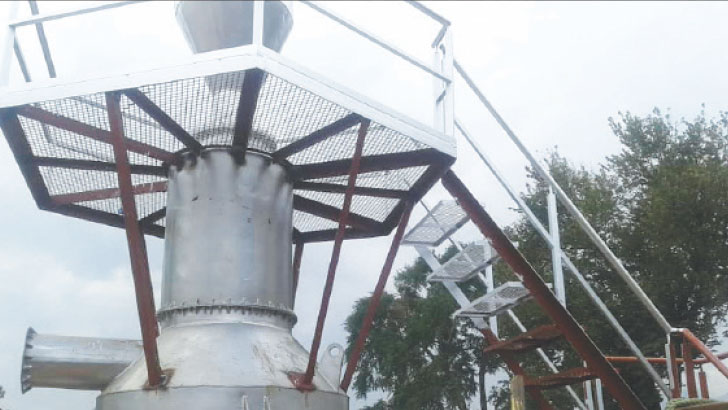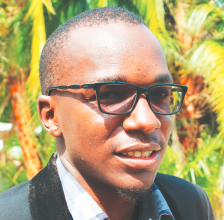Govt ignore innovation
T
he Malawi University of Science and Technology (Must) has come up with innovations that turn waste into electrical energy—to address the country’s energy poverty – but lack of support is making it difficult for the technology to reach out to the wider population.
In the last two years—Must, with funding from donors, has been conducting research that has led to development of waste-powered electricity that is currently supporting some business places and areas in Malawi.
In an interview the Head of Department of Energy Resources Management at Must Dr. John Taulo said the country, given the abundance of waste, has huge potential for biogas which can change the energy landscape and create industries worth one million jobs.

“Must has developed experience to convert waste into energy as a solution to the country’s energy woes. Biomass in many forms, agricultural resides, forest residues, municipal solid wastes, animal wastes is the new untapped energy source that can augment the energy supply in a more sustainable way” argued Taulo.
But Taulo indicated that while they have a wealth of ideas they are poorly funded to carry out research and come up with innovations and instead they are surviving on well-wishers.
At Tsangano Market in Ntcheu, Must in partnership with Green Impact Technologies (GIT), has installed a biogas plant with a 50 cubic metre digester which is turning waste from vegetables into heating energy. A few business places which include restaurants have benefited from this innovation for cooking.
The plant is a product of the university’s research funded by Science Granting Councils Initiative (SGCI) to a tune of $28 500 (K22.7 million).
According to a policy brief on this project, which we have seen, the plant, apart from solving energy challenges, is also beneficial in that it helps to make the market hygienic as waste is collected for energy making. The product from this process is liquid fertiliser which can be used for crop production.
Joyce Chivunga, another energy scientist at Must who is involved in this project, said the next move is to replicate the project to other equally deserving market places. Once this is done, it will surely improve the ease of doing business in most of these markets that lie along the M1 and usually operate from day to night.
But over a year after installation—there is no replication of the project and it is not working at its full best for lack of support. According to Taulo once the university has come up with such innovation they expect others, especially government and the private sector to take over.
Powering communities with rice husks
Taulo and others researchers; Hendrex Kazembe, Willy Maruwo and Alfred Maluwa have also come up with a husk-gasification plant which turns rice husks into energy.
Must responded to the call for application and received a $30 000 grant – to undertake this study—in 2019 whose objective was to design, develop and characterise rice husk gasification system as an alternative source of power for electricity generation.
According to the executive summary of the study, this project is been implemented in Phalombe—Wowo cluster, in Traditional Authority Nkhulambe “because there is high quantity production of rice in the area”. Must settled for this area also due to cost limitation as other rice growing places such as Salima and Karonga were considered far.
Another reason is that the targeted community is close to Mulanje Mountain where the community harvest their firewood—so in a way the project would help to conserve the environment. The pilot phase was meant to electrify 400 households including business such as maize mill, barbershops and hair salons.
Must estimates that about $100 000 (about K80 million) is needed for the pilot project to be fully operational. After the pilot phase, the plan is to have it extended to other rice growing areas. Beyond rice husks the researchers are thinking of equally making use of maize cobs for production of electricity. Maize is widely grown in Malawi which may translate to more people having access to this form of energy.
But Taulo said this innovation is stuck for lack of funding and even after engaging government for support nothing has happened.
“We have huge potential for biogas. I know of technologies where just one reactor can produce about two megawatts—meaning if you have five of these we are talking of 10 megawatts. Waste is readily available—making it a cheaper source than hydro-power which is depended on availability of water. But lack of support frustrates us.”
Taulo said while some donors may be helpful “the challenge is that they may not be interested in this innovation but others. But we feel this is the best alternative because we have a lot of wastes in cities and villages which include plastics—all these are potential source of energy. But we have no support”.
The National Council for Science and Technology (NCST) which is expected to promote such innovations is poorly funded to make a difference such that researchers are surviving on donors. In an earlier interview director general for NCST Professor Elijah Wanda conceded that they are failing to reach out to researchers and promote innovations for lack of funding.
Wanda added: “We are looking at ways of making sure the innovation reaches out to those that need it the most”.
Taulo indicated that scientists but other players, who include the private sector and government can equally play a role to popularise the technology to alleviate Malawi’s energy poverty.





